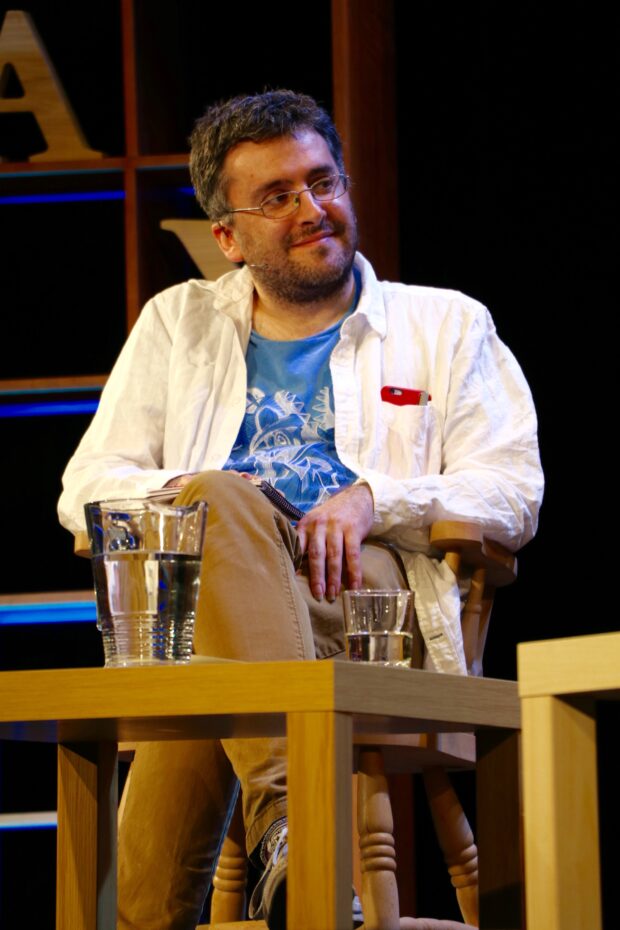You have no items in your cart. Want to get some nice things?
Go shopping
ZL: Your newest translation Whites Can Dance Too by Kalaf Epalanga has just hit the shelves, what drew you to translate it?
I first met Kalaf in Lisbon through a common friend many, many years ago – long before he’d written this book. Ever since that first meeting, I’d kept an eye on what he was doing, and I read the Portuguese version of the novel when it appeared – there was so much about it that I loved, that spoke to me as a reader (and as a translator and as a music lover and more…), so I was very excited to work with Kalaf and his agent to try and find it a home in the English-speaking world, and to take on the task of writing its English voices.
ZL: Tell us about the process of collaborating with Kalaf Epalanga?
Ah, this was such a treat. Kalaf’s English is excellent, which helps from a very practical point of view – he was eager to read a draft of the whole translation, and not only answered some specific questions but made really useful suggestions and observations himself. But much more importantly than this, he was incredibly willing to collaborate, taking editorial advice and even reshaping parts of the book – it’s rare to have the opportunity to work with a writer who’s so immediately collaborative, not at all precious, very open, very generous with his time and talents.
ZL: Kalaf puts music and rhythm at the centre of his novel. How do you go about translating something so intangible into a different language?
Music and rhythm were very important things to think about, but not in the sense that they’re the book’s subjects (that’s easy enough), but in the way they absolutely infuse the prose itself. Each of the three narrative voices is slightly different, each one moves to a slightly different beat; translating them meant being aware of the ways they were distinctive, and the ways I could keep them so.
ZL: What do you enjoy about translating?
Well, in this case, I spent three months living inside this great novel – reading it, recreating each small part, and reading it some more, and editing it, and understanding it better, and discussing with the author, and reading it again… If a book is any good, what could be more fun? And this is something I could never have written myself, yet I still got to inhabit that extraordinary process of making it, somehow.
ZL: Across different stories, the narrative often draws a lot from the cultural mileu of the writer. There are colloquiallisms that may not express themselves the same way in another culture. And we find that language, itself, perpetually grants meaning to culture. In the world of international writing and translated literature how do you interact with this when translating to a different language?
Part of the answer to this is just about doing all the research, doing it seriously. There are some parts of the cultures Kalaf writes about that I’m familiar with, and there are some that are relatively new to me. I suspect the same would be true for any translator, for a book set in Portugal and Norway (and a bit in Luanda and London), featuring the lives of characters from Angola and Brazil and elsewhere. I haven’t asked Kalaf about this, but I’m assuming that when he wrote the large section of the book that’s narrated by a Norwegian police officer, he too had to do some research. In a lot of cases, what that meant specifically was familiarising myself with music – so often that’s an important part of each character’s frame of reference – which was no great hardship!
ZL: You’ve translated over 70 books from Portuguese, Spanish, and French. Do you have a consistent approach to translation, or does it change depending on the text?
It changes surprisingly little! Different texts make quite different demands – they free and constrain a translator in different ways. But the actual process varies very little for me, whether it’s a rhyming children’s picture-book or a play for the theatre.
ZL: Thank you so much for your responses. As we move forward, what are some of the projects you’re excited about in the near future?
So many things, and plenty of variety! This summer I’m publishing two books by my old friend José Eduardo Agualusa (a novel and a collection of short stories), and a brilliant novel by Martín Kohan, then a gorgeous illustrated non-fiction book about lighthouses… Once I’m done with the two books I’m currently polishing off (a co-translation of a non-fiction book about death, and a novel by Gonçalo M. Tavares), I have a really exciting new Brazilian novel to do. After which I have to stop translating for a bit, as I’m supposed to be writing a book myself and the deadline isn’t quite as far away as I’d like…
About Zadie Loft
Zadie read Classics at Downing College, Cambridge, and is currently studying for an MSt in Creative Writing at Kellogg College, Oxford. She has previously been a columnist for the Cambridge Varsity newspaper and a prose and verse contributor for La Piccioletta Barca. She is Litro's Editorial Strategist.




